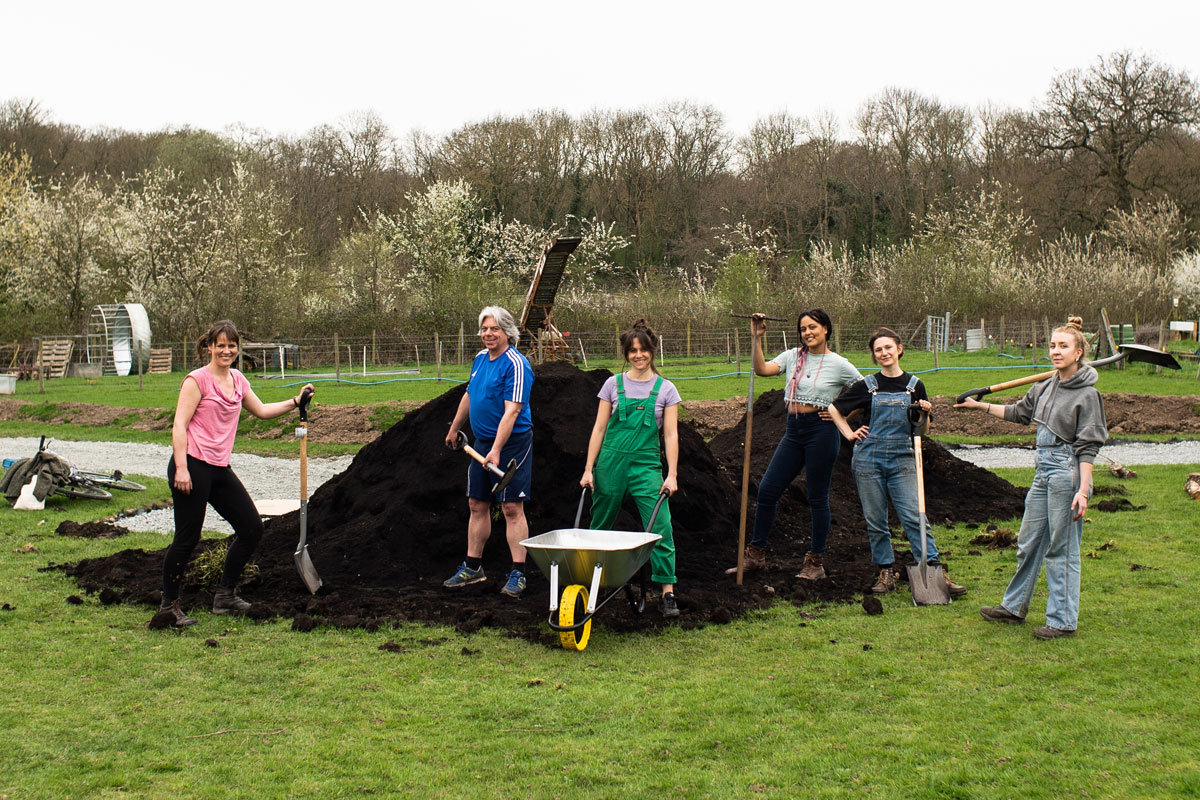 The SitopIa team by Thomas Broadhead
The SitopIa team by Thomas Broadhead
A HUNGRY CITY
The last year has been a period of extraordinary change, with Covid and Brexit leading people to ask more about where their food comes from and offering a chance to rethink how we grow and eat – for the better.
“While there’s been increased demand for food from community enterprises,” says Rob Logan from Sustain “there’s also a new generation of growers – seen in the growth of interest in farming organisations like the Landworkers Alliance.”
The task now is to meet this demand for good food with a supply of land.
The land is there, even around London, much of it high grade agricultural land, often used for grazing horses and even lavender farms. But of the 11,000 hectares of farms, only 260 are growing fruit and vegetables, despite the hungry population. A Sustain report suggests just a 1.4% conversion of these farms to horticultural production could grow around 1,340 tonnes of food, sold straight to London markets.
DREAMING OF SITOPIA
Sustain’s Fringe Farming campaign is “focused on that obstacle: increasing access to land at the edge of cities” explains Rob, who is highlighting the benefits of fringe farming (a.k.a peri-urban farming) to councils and others. It offers not just fresh and healthy food, but environmental and social benefits too.
“It can reacquaint city dwellers with what it means to feed them and get them excited and involved with it again,” says Carolyn Steel, author of Hungry City and Sitopia. “That’s the kind of revolution we need: one where our economy and our culture values food again; where we care about what we eat, how it’s made and where it came from...”
Carolyn now sits on the board of Sitopia Farm, set up by civil-servant-turned-grower Chloe Dunnett. Following a successful crowdfunding campaign, combined with a grant from the Mayor of London, Chloe plans to transform two acres of land in Greenwich into a model agroecological peri-urban farm. “We want to create a beautiful farm where we’ll grow things that make sense to be grown in cities – highly perishable produce like salad, vegetables, fruit and herbs” she explains. “We want this to be a place that’s inclusive and diverse in all its forms. One of the things that’s really important for us is making good food and farming accessible. We will have lots of open days, volunteering, community feasts, workshops and school visits.”
A MARKET ON YOUR DOORSTEP
It’s not easy to make farming work financially, but peri-urban farms can explore routes to market more readily available thanks to their proximity to the city. Chrissy Harrison, who runs Keats in Bexley, sells to many local restaurants and farmers markets and sees many pluses to her location. “I have a high value economy on my doorstep which I’m using to make my veg boxes accessible,” she explains. “I’m thinking about increasing restaurant prices, so the produce is affordable for people living locally, that’s one of the benefits of these restaurants on your doorstep: they support me and in turn, I support the community.” She also sees benefits to rural farmers who can sell to her box scheme.
With more potential threats to food supply, the growing movement of fringe farmers provide a chance to build resilient food production closer to where we live, with opportunities to learn, grow and connect with all that nourishes us – and the best thing? “Direct access to a supply of freshly harvested produce, obviously” adds Chrissy.
@sitopiafarm
@carolynsteel.sitopia
@cropdroporganicveg
@keatsorganics
@elliecostigan
This first appeared in the Jellied Eel print magazine - Issue 63.
London Food Link: London Food Link brings together community food enterprises and projects that are working to make good food accessible to everyone in London to help create a healthy, sustainable and ethical food system for all.
Sustain
The Green House
244-254 Cambridge Heath Road
London E2 9DA
020 3559 6777
sustain@sustainweb.org
Sustain advocates food and agriculture policies and practices that enhance the health and welfare of people and animals, improve the working and living environment, promote equity and enrich society and culture.
© Sustain 2024
Registered charity (no. 1018643)
Data privacy & cookies